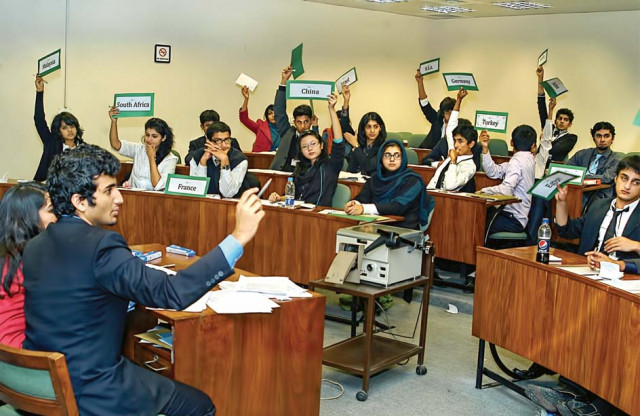LUMUN: ‘Stop blaming others for Pakistan’s problems’
Students at LUMS' Model UN Conference warn they will have to pay off debts generated by current failures.

“The lack of a culture of accountability and responsibility in our country has harmed us particularly in the political and economic fields. We are left with a culture of extremism,” said Rashid to a packed audience at the LUMS Sports Complex.
Over 800 students from schools, colleges and universities across Pakistan are attending the four-day conference. Earlier in the day, they sat in various mock UN committees as representatives of 100 UN member states to discuss current global issues.
Rashid said that Pakistan’s political history was full of incidents demonstrating the lack of accountability. No-one had taken responsibility for the secession of East Pakistan, Kargil, the war of 1965 or the assassination of Benazir Bhutto, nor taken the “bold steps” necessary to hold the culprits accountable.
He said that it was every Pakistani’s responsibility to pay taxes, but 90 per cent of them did not pay their taxes. The world had not been as generous as needed in their donations to help the flood-affected because they knew Pakistanis don’t pay taxes, he said.
“Instead of blaming the world, we should take responsibility and raise GST and agriculture and income tax,” he said, and urged political parties to help foster a taxpaying culture in the country.
Rashid warned the students in the audience that they would be the ones to suffer if the economy continued to suffer from high unemployment and inflation. The young are effectively about $60 billion in debt, he said.
He said that the tendency to blame others was also a common trait in the general public. When the issue of extremism arose in Swat, people blamed India, the USA, the UK and Israel. He said the blame for extremism in Pakistan lay with Gen Ziaul Haq and his Afghan jihad. He said that it was the responsibility of the state to promote a culture of accountability and responsibility in Pakistan. “The private sector cannot do so, even Babar Ali through LUMS,” he said.
Rashid said that several acts or attempted acts of terrorism had been traced back to the Tribal Areas and this had hurt Pakistan. Faisal Shahzad’s attempt to blow up Times Square in New York had just made it even harder for Pakistani students to get visas to study abroad, he said.
LUMS Pro Chancellor Syed Babar Ali said that the conference gave students from all over Pakistan a unique chance to promote tolerance and harmony. He congratulated the participants and hoped that they would treat each other with patience and respect.
LUMUN Patron Shaharyar Khan, a former foreign secretary, said that the recognition gained by LUMUN – it won a best model UN award from Harvard in 2004 – was down to the hard work of students from all over Pakistan. He hoped that the conference would help the students understand others’ viewpoints.
Also on Thursday, the students took part in two committee sessions, a ‘Global Village’ contest where they showcased the cultures of the countries they represented, and a video conference with an official from Global Zero, an NGO that advocates the complete elimination of nuclear weapons. The conference ends on Sunday.
Published in The Express Tribune, December 24th, 2010.



















COMMENTS
Comments are moderated and generally will be posted if they are on-topic and not abusive.
For more information, please see our Comments FAQ